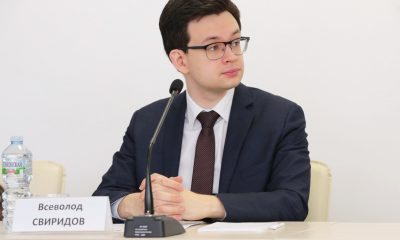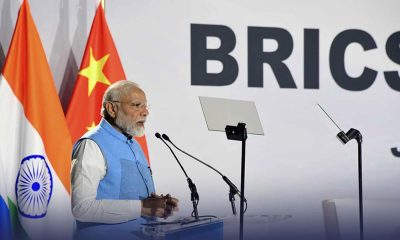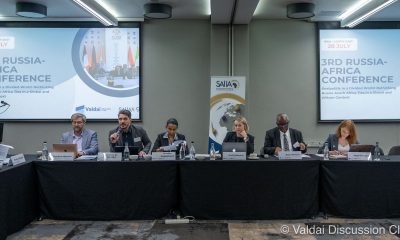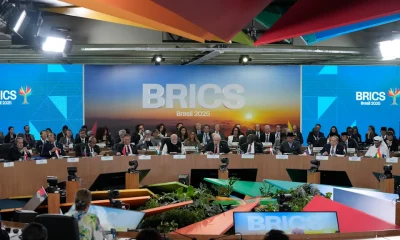World
BRICS+ and G20: Competing or Collaborating for Global South
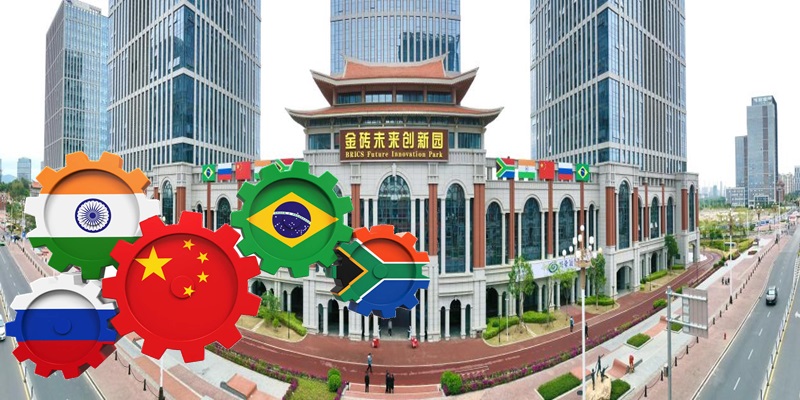
By Kestér Kenn Klomegâh
South Africa’s Cyril Ramaphosa heads G20, an intergovernmental forum comprising 19 sovereign countries, the European Union, and the African Union, while Brazil’s Luiz Inácio Lula da Silva chairs BRICS+, an association made of Brazil, Russia, India, China and South Africa with four new members and 13 partner states in a category mostly from developing countries.
At a quick glance, the G20 and BRICS+ are respectively chaired this year 2025 by South Africa and Brazil, both BRICS+ members, which makes it distinctively important development for the changing geopolitical world. In 2025, G20 and BRICS+ agenda features a pivotal role and pledge to continue making concerted strides, either in keen competition for economic revitalization or in close collaboration as development players, in the Global South.
Historically, G20 was created back in 1999 as a group of twenty of the world’s largest economies to deal primarily with multifaceted aspects of existing global economic, trade, health, climate change and political issues. Dissatisfied with the global dominance of the United States and the stack failure of leaders of developing countries, especially in Africa, to raise their economic status to an appreciable levels and improve standards of living for the largely impoverished population, BRIC appeared in 2009, in city of Yekaterinburg, Russia.
South Africa ascended in 2010, transforming it into BRICS. As popularly now referred to as BRICS+, its key objective aspiration is to support building a better economic architecture for the Global South. In addition, BRICS+, as a non-western association, operates against western hegemony and uni-polar, rules-based system. Its key priority aims at shaping a more equitable and a more balanced global order while collaborating with developing countries in raising their economic status in the Global South.
An insight into G20 and BRICS+ including its “partner states” category shows the huge economic structure, the natural and human resources necessary for the future of mankind. We have observed several discussions, at highest levels these several years, on intensifying whatever political dialogue and exchange of views, economic collaborations and interactions on bilateral and multilateral mechanisms for developing better conditions in the Global South. Bridging the economic and standards of living gap have been on the agenda for both G20 and BRICS+ during previous years.
Every year, the leaders of G20 members meet to discuss mainly economic and financial matters and coordinate policy on some other issues of mutual interest. Every year, BRICS+ members summit features extensive deliberations on the United States global dominance and hegemony, without adequately addressing economic lapses in the developing Global South. Several summit declarations have adopted in that directions, but remain purely as collective declarations.
G20 and BRICS+ agenda in 2025?
As geopolitical situation heightens, G20 and BRICS+ are championing its a fresh version of governance reforms in their ways, and further reviewing the current operations of multilateral institutions such as the United Nations, the World Trade Organization (WTO), International Monetary Fund (IMF)and the World Bank for developing countries in the Global South. Despite these common goals, G20 and BRICS+ still have the main points of discontention. BRICS+ shares, in its declarations, dissatisfaction over over-exploitation of resources in and rules-based approach towards developing world.
In the Ministry of International Relations and Cooperation’s media release in January 2025, titled “The G20 is made up of 13 Engagement Groups”, stated that “South Africa fully supports the approach of strengthening partnerships and expanding dialogue with a wide range of actors; including States, international organizations and civil society; to collectively shape the G20’s approach to issues requiring international cooperation.” (South Africa’s chairmanship of G20, Jan. 2025)
It further recognizes the significant strides made by the Brazilian G20 presidency (2024) in enhancing the G20 as a site of democratic global engagement. The South African presidency will continue this trajectory. In South Africa’s G20 presidency, further modalities will be developed to involve a wide range of stakeholders throughout the year, particularly on priority initiatives. Until the G20 Leaders’ Summit in November 2025, South Africa is expected to bring together representatives of the existing engagement groups and other segments of civil society that may offer meaningful contributions to the G20.
For the BRICS+ agenda, focus is placed on the need to reform the current international financial architecture to meet the global financial challenges. As already explained, the measures are to facilitate the development of the economy, international trade, and the achievement of the sustainable development goals.
In addition to the financial architecture, BRICS+ has agreed to discuss and study the feasibility of establishment of an independent cross-border settlement and depositary infrastructure, an initiative to complement the existing financial market infrastructure, as well as independent reinsurance capacity and the possibility of expanding innovative financial practices and approaches for projects and programmes, including finding acceptable mechanisms of financing in local currencies.
BRICS+ has reaffirmed its commitment to maintaining a strong and effective Global Financial Safety Net with a quota-based and adequately resourced IMF at its centre. On G20, BRICS+ recognized the importance of the continued and productive functioning of the G20, based on consensus with a focus on result-oriented outcomes. In other words, both would play complimentary role in the global economy, and appreciating efforts with a focus on development trends in the Global South.
South Africa Driving Development Goals
In accepting G20 chairmanship early December in Cape Town, South Africa explicitly indicated a number of practical ways forward in consolidating G20 on the world stage as it strives to gain additional significant momentum in 2025.
South Africa, however, insisted that G20’s relations have to be compatible with development gaols of the Global South. The main argument here is that the G20 comprises many of the world’s largest developing and developed economies. Therefore, G20 has to play a critical role in influencing policies and foster economic stability to have a direct impact on the lives of all members of the global community.
It has a wide agenda that now includes trade sustainable development, health, agriculture, energy, the environment, climate change and anti-corruption. These agenda initiatives are not only to drive economic progress but also to accelerate and support long-term investment opportunities across the continents especially in Africa.
The outlook for global economic growth remains unpredictable, and many economies carry the burden of unsustainable levels of debt. Geopolitical instability, conflict and war are causing further hardship and suffering. Across the world, billions of people are affected by under-development, inequality, poverty, hunger and unemployment.
Strengthening Economic Partnership
Working together with G20 members and building partnerships across society is one the surest pathways to confront the development challenges. Exploring the development pathways, without any geopolitical discrimination but with caution, to achieve more rapid, inclusive and economic growth for future generations.
The G20 provides us with a platform to pursue these collective goals. South Africa has adopted the theme ‘Solidarity, Equality and Sustainability’ for its G20 Presidency. Through solidarity, we can create an inclusive future that advances the interests of people at the greatest risk of being left behind.
Under South Africa’s leadership, the G20 leaders have to work seriously with African Union and European Union, through this year, until its final summit which will take place in Johannesburg in November 2025. South Africa’s presidency, for the first time an African country has presided over the G20, in line with above-mentioned theme, there is the necessity to strengthen and advance consistent efforts to achieve the Sustainable Development Goals by 2030.
Africa’s Noticeable Challenges
Until today, Africa faces multitude of challenges. The continent, comprising 55 States, was declared as politically independent in 1963 and yet is confronted with challenges of an excellent model of governance and exemplary leadership. Basic tenets of transfers as stipulated within framework of constitutions are usually marked by conflicts, opposition groups are frequently banned from operating in the country.
This is further simply compounded by economic under-development which impact heavily on living standards of majority of the population across the Africa. Despite huge untapped natural resources, tackling the economy requires finances which many African countries lack primarily due to inability to design national priority actions. Urban-rural development disparities have taken its characteristic shape in many geographic parts of Africa.
The local African, multilateral financial institutions, development banks and the private sector need to scale up, with a fairer and appropriate lending conditions to ensure debt sustainability for low-income countries.
In fact, Africa still needs more investment in infrastructure, healthcare, education and finance for sustaining many other development needs, and as well as to consider extending debt relief to developing economies. These are challenges for G20 and BRICS+ to champion their critical positions as engines for growth and development in Africa, and Global South.
In 2025, there is unshakeable (amplified) hope that both South Africa’s G20 directorship and Brazil’s BRICS+ chairmanship, focus would be on pursuing remarkable progress on cross-cutting development issues throughout Africa and across Global South.
Logical Expectations
In this fast-changing landscape characterized by forging new alliances, the practical implementation of the Russia’s initiatives, against the backdrop of escalated tensions, fostering cooperation not confrontation, will rather help effectively in addressing challenges. One more significant point is that there may be important linkages emerging between BRICS+ and G20. Undoubtedly, Brazil in 2025 is likely to base its priorities on some of the themes that were pursued in 2024 during its chairmanship in G20.
BRICS and G20, critical over global political developments and economic growth, but both could complement efforts as partners in tackling existing challenges, coordinate approaches and strategies. Particularly, Africa, as part of the developing Global South, has increasingly become the subject of deliberations at high-level summits and conferences, noting that more 60% of its population still wallow in abject poverty.
Understanding the puzzling paradox that Africa has huge untapped natural resources and adequate human capital to engage in development. Often asked rhetorical question why ‘the Asian tigers’ developed while ‘the African lions’ declined these past several years. South Africa, as the current G20 president, has to set the platform this 2025 for practical dialogue at G20, which includes BRICS members, to adopt collective towards Africa’s development goals including those in energy, industrialization, infrastructure and agriculture.
Logical Conclusion
As we mark the end of this first quarter century in 2025, it behoves on individual leaders, states and their stakeholders to act rather than engage in persistent criticisms and trading geopolitical rhetoric. On one hand, BRICS+ bloc is rapidly evolving as an alternative platform for global cooperation. For substantive continuity, BRICS+ apparently has to ensure that the initiatives raised during Russia’s presidency, and previous summits, members and the “partner states” maintain unwavering commitment towards their realization.
But on the other hand, G20 has to readjust and adapt its collective approach towards diverse perspectives, reform its models of operations to compliment and support development initiatives of the Global South. While appreciating in the final summary that G20 and BRICS+ platforms are created for driving global development and expected optimal economic growth, and further to engage in tackling challenges in order to register visible impact, it is highly necessary to emphasize the importance of trust and collaboration.
Moreover, the geopolitical implications are already known. But this, as a whole, becomes ultimately the greatest interest in their current deliberations. It is really a defining moment for Africa, and in general, for the Global South. Both G20 and BRICS+ have to subsequently demonstrate strategic steps in actualizing the aspirations as we move forward into the future.
World
Ukraine Reveals Identities of Nigerians Killed Fighting for Russia

By Adedapo Adesanya
The Ukrainian Defence Intelligence (UDI) has identified two Nigerian men, Mr Hamzat Kazeem Kolawole and Mr Mbah Stephen Udoka, allegedly killed while fighting as Russian mercenaries in the war between the two countries ongoing since February 2022.
The development comes after Russia denied knowledge of Nigerians being recruited to fight on the frontlines.
Earlier this week, the Russian Ambassador to Nigeria, Mr Andrey Podyolyshev, said in Abuja that he was not aware of any government-backed programme to recruit Nigerians to fight in the war in Ukraine.
He said if at all such activity existed, it is not connected with the Russian state.
However, in a statement on Thursday, the Ukrainian Defence released photographs of Nigerians killed while defending Russia.
“In the Luhansk region, military intelligence operatives discovered the bodies of two citizens of the Federal Republic of Nigeria — Hamzat Kazeen Kolawole (03.04.1983) and Mbah Stephen Udoka (07.01.1988),” the statement read.
According to the statement, both men served in the 423rd Guards Motor Rifle Regiment (military unit 91701) of the 4th Guards Kantemirovskaya Tank Division of the armed forces of the Russian Federation.
UDI said that they signed contracts with the Russian Army in the second half of 2025 – the deceased Mr Kolawole on August 29 and Mr Udoka on September 28.
“Udoka received no training whatsoever — just five days later, on October 3, he was assigned to the unit and sent to the temporarily occupied territories of Ukraine,” the report read.
It added that no training records for Mr Kolawole have been preserved; however, it is highly likely that he also received no military training, but his wife and three children remain in Nigeria.
Both Nigerians, the report added, were killed in late November during an attempt to storm Ukrainian positions in the Luhansk region.
“They never engaged in a firefight — the mercenaries were eliminated by a drone strike,” UDI stated, warning foreign citizens against travelling to the Russian Federation or taking up any work on the territory of the “aggressor state”.
“A trip to Russia is a real risk of being forced into a suicide assault unit and, ultimately, rotting in Ukrainian soil,” the statement read.
In an investigation earlier this month, CNN reported that hundreds of African men have been enticed to fight for Russia in Ukraine with the promise of civilian jobs and high salaries. However, the media organisation uncovered that they are being deceived or sent to the front lines with little combat training.
CNN said it reviewed hundreds of chats on messaging apps, military contracts, visas, flights and hotel bookings, as well as gathering first-hand accounts from African fighters in Ukraine, to understand just how Russia entices African men to bolster its ranks.
World
Today’s Generation of Entrepreneurs Value Flexibility, Autonomy—McNeal-Weary

By Kestér Kenn Klomegâh
The Young African Leaders Initiative (YALI) is the United States’ signature step to invest in the next generation of African leaders. Since its establishment in 2010 by Obama administration, YALI has offered diverse opportunities, including academic training in leadership, governance skills, organizational development and entrepreneurship, and has connected with thousands of young leaders across Africa. This United States’ policy collaboration benefits both America and Africa by creating stronger partnerships, enhancing mutual prosperity, and ensuring a more stable environment.
In our conversation, Tonya McNeal-Weary, Managing Director at IBS Global Consulting, Inc., Global Headquarters in Detroit, Michigan, has endeavored to discuss, thoroughly, today’s generation of entrepreneurs and also building partnerships as a foundation for driving positive change and innovation in the global marketplace. Here are the excerpts of her conversation:
How would you describe today’s generation of entrepreneurs?
I would describe today’s generation of entrepreneurs as having a digital-first mindset and a fundamental belief that business success and social impact can coexist. Unlike the entrepreneurs before them, they’ve grown up with the internet as a given, enabling them to build global businesses from their laptops and think beyond geographic constraints from day one. They value flexibility and autonomy, often rejecting traditional corporate ladders in favor of building something meaningful on their own terms, even if it means embracing uncertainty and financial risk that previous generations might have avoided.
And those representing the Young African Leaders Initiative, who attended your webinar presentation late January 2026?
The entrepreneurs representing the Young African Leaders Initiative are redefining entrepreneurship on the continent by leveraging their unique perspectives, cultural heritage, and experiences. Their ability to innovate within local contexts while connecting to global opportunities exemplifies how the new wave of entrepreneurs is not confined by geography or conventional expectations.
What were the main issues that formed your ‘lecture’ with them, Young African Leaders Initiative?
The main issues that formed my lecture for the Young African Leaders Initiative were driven by understanding the importance of building successful partnerships when expanding into the United States or any foreign market. During my lecture, I emphasized that forming strategic alliances can help entrepreneurs navigate unfamiliar business environments, access new resources, and foster long-term growth. By understanding how to establish strong and effective partnerships, emerging leaders can position their businesses for sustainable success in global markets. I also discussed the critical factors that contribute to successful partnerships, such as establishing clear communication channels, aligning on shared goals, and cultivating trust between all parties involved. Entrepreneurs must be proactive in seeking out partners who complement their strengths and fill gaps in expertise or resources. It is equally important to conduct thorough due diligence to ensure that potential collaborators share similar values and ethical standards. Ultimately, the seminar aimed to empower YALI entrepreneurs with practical insights and actionable strategies for forging meaningful connections across borders. Building successful partnerships is not only a pathway to business growth but also a foundation for driving positive change and innovation in the global marketplace.
What makes a ‘leader’ today, particularly, in the context of the emerging global business architecture?
In my opinion, a leader in today’s emerging global business architecture must navigate complexity and ambiguity with a fundamentally different skill set than what was previously required. Where traditional leadership emphasized command-and-control and singular vision, contemporary leaders succeed through adaptive thinking and collaborative influence across decentralized networks. Furthermore, emotional intelligence has evolved from a soft skill to a strategic imperative. Today, the effective modern leader must possess deep cross-cultural intelligence, understanding that global business is no longer about exporting one model worldwide but about genuinely integrating diverse perspectives and adapting to local contexts while maintaining coherent values.
Does multinational culture play in its (leadership) formation?
I believe multinational culture plays a profound and arguably essential role in forming the kind of leadership required in today’s global business environment. Leaders who have lived, worked, or deeply engaged across multiple cultural contexts develop a cognitive flexibility that’s difficult to replicate through reading or training alone. More importantly, multinational exposure tends to dismantle the unconscious certainty that one’s own way of doing things is inherently “normal” or “best.” Leaders shaped in multicultural environments often develop a productive discomfort with absolutes; they become more adept at asking questions, seeking input, and recognizing blind spots. This humility and curiosity become strategic assets when building global teams, entering new markets, or navigating geopolitical complexity. However, it’s worth noting that multinational experience alone doesn’t automatically create great leaders. What matters is the depth and quality of cross-cultural engagement, not just the passport stamps. The formation of global leadership is less about where someone has been and more about whether they’ve developed the capacity to see beyond their own cultural lens and genuinely value differences as a source of insight rather than merely tolerating them as an obstacle to overcome.
In the context of heightening geopolitical situation, and with Africa, what would you say, in terms of, people-to-people interaction?
People-to-people interaction is critically important in the African business context, particularly as geopolitical competition intensifies on the continent. In this crowded and often transactional landscape, the depth and authenticity of human relationships can determine whether a business venture succeeds or fails. I spoke on this during my presentation. When business leaders take the time for face-to-face meetings, invest in understanding local priorities rather than imposing external agendas, and build relationships beyond the immediate transaction, they signal a different kind of partnership. The heightened geopolitical situation actually makes this human dimension more vital, not less. As competition increases and narratives clash about whose model of development is best, the businesses and nations that succeed in Africa will likely be those that invest in relationships characterized by reciprocity, respect, and long-term commitment rather than those pursuing quick wins.
How important is it for creating public perception and approach to today’s business?
Interaction between individuals is crucial for shaping public perception, as it influences views in ways that formal communications cannot. We live in a society where word-of-mouth, community networks, and social trust areincredibly important. As a result, a business leader’s behavior in personal interactions, their respect for local customs, their willingness to listen, and their follow-through on commitments have a far-reaching impact that extends well beyond the immediate meeting. The geopolitical dimension amplifies this importance because African nations now have choices. They’re no longer dependent on any single partner and can compare approaches to business.
From the above discussions, how would you describe global business in relation to Africa? Is it directed at creating diverse import dependency?
While it would be too simplistic to say global business is uniformly directed at creating import dependency, the structural patterns that have emerged often produce exactly that outcome, whether by design or as a consequence of how global capital seeks returns. Global financial institutions and trade agreements have historically encouraged African nations to focus on their “comparative advantages” in primary commodities rather than industrial development. The critical question is whether global business can engage with Africa in ways that build productive capacity, transfer technology, develop local talent, and enable countries to manufacture for themselves and for export—or whether the economic incentives and power irregularities make this structurally unlikely without deliberate policy intervention.
World
Russia Expands Military-Technical Cooperation With African Partners

By Kestér Kenn Klomegâh
Despite geopolitical complexities, tensions and pressure, Russia’s military arms and weaponry sales earned approximately $15 billion at the closure of 2025, according to Kremlin report. At the regular session, chaired by Russian President Vladimir Putin on Jan. 30, the Commission on Military and Technical Cooperation with Foreign Countries analyzed the results of its work for 2025, and defined plans for the future.
It was noted that the system of military-technical cooperation continued to operate in difficult conditions, and with increased pressure from the Western countries to block business relations with Russia. The meeting, however, admitted that export contracts have generally performed sustainably. Russian military products were exported to more than 30 countries last year, and the amount of foreign exchange exceeded $15 billion.
Such results provide an additional opportunity to direct funds to the modernization of OPC enterprises, to the expansion of their production capacities, and to advanced research. It is also important that at these enterprises a significant volume of products is civilian products.
The Russian system of military-technical cooperation has not only demonstrated effectiveness and high resilience, but has created fundamental structures, which allow to significantly expand the “geography” of supplies of products of military purpose and, thus strengthen the position of Russia’s leader and employer advanced weapons systems – proven, tested in real combat conditions.
Thanks to the employees of the Federal Service for Military Technical Cooperation and Rosoboronexport, the staff of OPC enterprises for their good faith. Within the framework of the new federal project “Development of military-technical cooperation of Russia with foreign countries” for the period 2026-2028, additional measures of support are introduced. Further effective use of existing financial and other support mechanisms and instruments is extremely important because the volumes of military exports in accordance with the 2026 plan.
Special attention would be paid to the expansion of military-technological cooperation and partnerships, with 14 states already implementing or in development more than 340 such projects.
Future plans will allow to improve the characteristics of existing weapons and equipment and to develop new promising models, including those in demand on global markets, among other issues – the development of strategic areas of military-technical cooperation, and above all, with partners on the CIS and the CSTO. This is one of the priority tasks to strengthen both bilateral and multilateral relations, ensuring stability and security in Eurasia.
From January 2026, Russia chairs the CSTO, and this requires working systematically with partners, including comprehensive approaches to expanding military-technical relations. New prospects open up for deepening military-technical cooperation and with countries in other regions, including with states on the African continent. Russia has been historically strong and trusting relationships with African countries. In different years even the USSR, and then Russia supplied African countries with a significant amount of weapons and military equipment, trained specialists on their production, operation, repair, as well as military personnel.
Today, despite pressure from the West, African partners express readiness to expand relations with Russia in the military and military-technical fields. It is not only about increasing supplies of Russian military exports, but also about the purchase of other weapons, other materials and products. Russia has undertaken comprehensive maintenance of previously delivered equipment, organization of licensed production of Russian military products and some other important issues. In general, African countries are sufficient for consideration today.
-

 Feature/OPED6 years ago
Feature/OPED6 years agoDavos was Different this year
-
Travel/Tourism10 years ago
Lagos Seals Western Lodge Hotel In Ikorodu
-

 Showbiz3 years ago
Showbiz3 years agoEstranged Lover Releases Videos of Empress Njamah Bathing
-

 Banking8 years ago
Banking8 years agoSort Codes of GTBank Branches in Nigeria
-

 Economy3 years ago
Economy3 years agoSubsidy Removal: CNG at N130 Per Litre Cheaper Than Petrol—IPMAN
-

 Banking3 years ago
Banking3 years agoSort Codes of UBA Branches in Nigeria
-

 Banking3 years ago
Banking3 years agoFirst Bank Announces Planned Downtime
-

 Sports3 years ago
Sports3 years agoHighest Paid Nigerian Footballer – How Much Do Nigerian Footballers Earn


